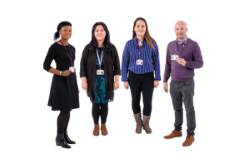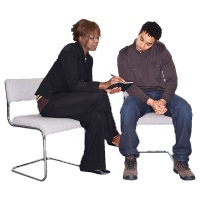Page Content
This page includes information about how we work with young people on:
- EHCP school reviews
- Give your voice
- Getting to know you
- Occupational Therapy support
- Plan and review your support
- Helpful technology
Your EHCP school reviews

Our SEND Team will lead on reviewing the Education, Health and Social Care Plan (EHCP). However, if we know about a young person and they are on our pathway, the Transition Team may take part in the EHCP School Reviews, from Year 9.
This will help us hear about the young person's plans, answer any questions about Adult Social Care, give advice and guidance and start to think about any support they might need once they are 18.
They should give the young person and their family time to look into the best options available in their local area.
Your voice

It is important to the Transition Team that we hear the young person's views on their life and future.
The Mental Capacity Act is an especially important law. This law says that every adult, whatever their disability, has the right to make their own decisions wherever possible.
Everything that the Transition Team do must follow what the Mental Capacity Act says.
This means providing information, time, and support to allow young people to make their own decisions, where they are able.
If your loved one needs support to share their views, they may benefit from advocacy. Advocates don't speak on behalf of people with a learning disability – they make sure a person's own voice is heard. This can be somebody close to the young person like their parents or we can refer to a professional advocate if that is better.
If you would like to speak to someone in the Transition Team about a loved ones views please call us on 01276 800270 or email
If you would like to speak to someone in the Transition Team about your views please call us on 01276 800270 or email transitionteam@surreycc.gov.uk
Learn more about the The Mental Capacity Act.
Getting to know you
Your Adult Social Care Assessment

After someone turns 17, and they could require support from Adult Social Care, the Transition Team will arrange a meeting to get to know them and understand your hopes and plans for when you turn 18. We can have this meeting at a time and place of their choice with people they want to help them with this meeting.
At the meeting we can explore what practical support the young person might need to reach their life goals and be as independent as possible.
This may include:
- support to complete daily living tasks;
- education and training;
- getting ready for employment, and finding a job;
- taking part in activities and getting out and about in their local community and beyond.
They may also need advice from our occupational therapists for practical things to keep them moving or help with doing activities which they may find difficult.
The tool they use to record this information is called an Adult Social Care Assessment.
When the assessment is complete, we will tell the young person if they are eligible for funded support from Adult Social Care. And if not, we will also make sure they have information to help.
Getting ready for your Adult Social Care Assessment
We know these meetings can be overwhelming and these might seem like big questions and you may not know all the answers to everything.
The information below can help you and your loved one prepare by thinking about the questions.
The information below can help you prepare by thinking about the questions.
The Transition Team will help the young person and their family through this process. We will always make sure they have someone to help during these conversations and, if their ideas and plans change, then we will update the information at regular intervals.
We will always make sure the young person and their family has a copy of their Adult Social Care Assessment for them to keep.
Occupational Therapy Support

Occupational therapists provide practical support to people experiencing difficulty doing the activities that are meaningful to them. Occupational therapists work in a variety of settings and specialisms. Our occupational therapists provide a service to 18- 25 year olds who are known to the Transition Team. We complete specialist assessments which focus on the young person's daily living activities, wellbeing and independence, and their physical and social environment. The solutions we offer focus on:
- providing advice
- practicing different ways of doing an activity
- the use of technology
- provision of equipment or minor adaptations
- supporting you, and those who help you, with moving and handling
- occasionally, making recommendations to your local district or borough council for major structural adaptations to your home.
Young people will get support from an occupational therapist alongside their adult social care assessment and support planning process.
With their permission our occupational therapists will also liaise with family, school, social work, health and other professionals to share assessment information.
Planning and reviewing your support
Support plan

After the assessment, we will tell the young person if you can receive funded support from Adult Social Care. At this point we will make a plan together. This is called a support plan.
A support plan will include all the information to show how we can help the individual to reach their goals and what support they will need to get there.
The Transition Team will work with them to find the right support to do the things the young person wants to do. We will work with the young person and those who support them, to create your support plan. We want the young person to be at the centre of the plan and to hear what is important to them.
The plan might include:
- care and support to do everyday things
- the support you need to continue your education
- the support you need to explore paid or unpaid work opportunities
- help with finances
- taking part in activities to get you out and about
- help with decisions about where you want to live
- relationships or wellbeing advice.
The kinds of support that your plan could include are:
- Help from your friends and family
- support available in your community
- and tech-enabled care (things like apps that can support day to day life)
If someone needs a personal assistant to make the plan work, we may be able to pay so that they can pay someone to help. We can also pay someone acting on their behalf. This is called a Direct Payment.
Use Connect to Support Surrey to find support and activities in your community.
Reviewing your support
Once the support plan has started, we will check how the plan is working.

These checks are called reviews. The reviews help us to update the support plan if anything changes as the young person goes through transition to adulthood.
We will ask questions such as
- Is your plan helping you to achieve the things you wanted to?
- Is there anything else you would like to achieve?
- What would you like to change?
Reviews can happen whenever the young person talks to the Transition Team – it doesn't always have to be a 'big' meeting. What really matters is that everything is working for the young person and those important to them. There are many ways we can do this.
If there are any big changes for the young person we can make a new Adult Social Care Assessment. This might be when they:
- leave or college or finish a course
- get new skills or confidence
- want to try new things
- want to move home
Helpful technology

Digital development is constantly evolving especially assistive technology to help those with disabilities. Here find some apps to help support young people and their families.
We can give you a licence for some of the below if you are eligible for adult social care - some can be purchased privately if not eligible. Speak to your social care team if you feel this could work for you.
Brain in Hand
Brain in Hand helps people to live more independently.
Cost: Chargeable
AutonoMe
AutonoMe is a virtual support provider designed to improve the lives of vulnerable people.
Cost: Chargeable
Hear me now
Hear Me Now enables people to:
- capture what matters to them in a single user-friendly place
- add content in their preferred format: text, images, audio or video
- share information with carers and health professionals.
Cost: Free
Abilia
Abilia simplify peoples' everyday lives regardless of their need. They want to give people with special needs the chance to participate and be independent.
Cost: Free
Be my eyes
Be My Eyes is an app that connects blind and low-vision people with sighted volunteers and company representatives for visual assistance through a live video call.
Cost: Free
Wheelmap
Wheelmap allows you to mark and find wheelchair accessible places-worldwide.
Cost: Free
LetMeTalk
LetMeTalk is a free augmentative and alternative communication (AAC) app that provides everyone with a voice, including those who can't speak. The app allows you to line up images in a meaningful way to be read as a sentence.
Available on the App Store and for Android.
Cost: Free
MyChoicePad
MyChoicePad is a language and communication app that uses Makaton symbols (a simple type of sign language), signs and signing videos in addition to your own photos and audio.
Available on: ITunes (iPad only)
Cost: Free (with in-app purchases)
Find more information about useful equipment and technology to help you stay independent.

